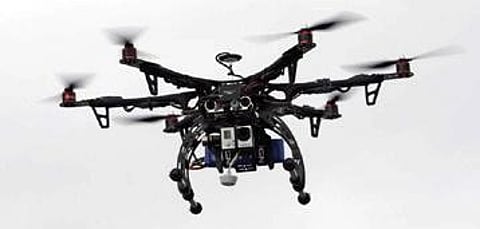

HYDERABAD: While the Telangana government awaits the Directorate General of Civil Aviation’s (DGCA) approval for using drones to deliver medicines as part of a project in collaboration with the World Economic Forum (WEF), it has now teamed up with the Public Health Foundation of India (PHFI) and Marut Dronestech for a similar project that would concentrate on the state alone.
The government is collaborating through its research body Research and Innovation Circle of Hyderabad (RICH). Currently, RICH, PHFI and Marut Dronestech is working to execute a pilot to check the operational and technical feasibility of the project, RICH officials told Express.
Sources said the pilot is likely to be taken up in Nalgonda as PHFI has done extensive research on the public health system there. When successful, it will take up the Telangana model in the rest of the country.
Perfect design
Meanwhile, Marut Dronetech is working on a design for the drone, which would be suitable for the purpose, considering the specifications of payload, carrying capacity and distances.
PHFI has conducted extensive needs assessment for several use cases, developed integration models with existing health systems and built modular temperature-controlled digital carrier box.
It is also helping with the overall project design by integrating computer vision, visual analytics, identification and screening of optimal locations for the hub setup.
RICH is helping in the business advisory, facilitating connections with the government, hospitals, blood banks and other stakeholders for implementing the project.
How it would work
A logistics team will be intimated on the need for supplies, which will be loaded onto the drone at a central hub or control centre. Before the drone takes off for its destination, regular pre-flight tests and checks of wind conditions, audio pilot systems, and GPS tracker will be done.
The destination coordinates will be fed into the drone systems and a healthcare professional in a village, sub-centre or a primary health centre will pick up the medical products at the drop-off point. “This can never be matched by surface or road-based transport systems. The entire process is maintained, monitored and recorded continuously,” the RICH official said.
‘Drones can solve supply chain shortcomings’
According to a RICH official, drones present a tremendous opportunity to address supply chain shortcomings in the healthcare sector, by optimising supply, reducing stock-outs and wastage.
“Complications of diseases such as dengue, conditions like postpartum haemorrhage, blood transfusion for accident victims and even race-against-time cases of organ transplantation can be better managed by a drone-led supply chain,” the official said